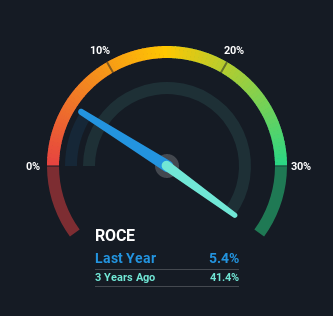- United Kingdom
- /
- Specialty Stores
- /
- LSE:SCS
Some Investors May Be Worried About ScS Group's (LON:SCS) Returns On Capital
Finding a business that has the potential to grow substantially is not easy, but it is possible if we look at a few key financial metrics. Ideally, a business will show two trends; firstly a growing return on capital employed (ROCE) and secondly, an increasing amount of capital employed. Basically this means that a company has profitable initiatives that it can continue to reinvest in, which is a trait of a compounding machine. In light of that, when we looked at ScS Group (LON:SCS) and its ROCE trend, we weren't exactly thrilled.
Return On Capital Employed (ROCE): What is it?
If you haven't worked with ROCE before, it measures the 'return' (pre-tax profit) a company generates from capital employed in its business. The formula for this calculation on ScS Group is:
Return on Capital Employed = Earnings Before Interest and Tax (EBIT) ÷ (Total Assets - Current Liabilities)
0.054 = UK£7.7m ÷ (UK£242m - UK£98m) (Based on the trailing twelve months to January 2021).
Thus, ScS Group has an ROCE of 5.4%. In absolute terms, that's a low return and it also under-performs the Specialty Retail industry average of 12%.
View our latest analysis for ScS Group

Above you can see how the current ROCE for ScS Group compares to its prior returns on capital, but there's only so much you can tell from the past. If you'd like, you can check out the forecasts from the analysts covering ScS Group here for free.
What Does the ROCE Trend For ScS Group Tell Us?
The trend of ROCE doesn't look fantastic because it's fallen from 32% five years ago, while the business's capital employed increased by 454%. That being said, ScS Group raised some capital prior to their latest results being released, so that could partly explain the increase in capital employed. It's unlikely that all of the funds raised have been put to work yet, so as a consequence ScS Group might not have received a full period of earnings contribution from it.
On a related note, ScS Group has decreased its current liabilities to 40% of total assets. That could partly explain why the ROCE has dropped. What's more, this can reduce some aspects of risk to the business because now the company's suppliers or short-term creditors are funding less of its operations. Since the business is basically funding more of its operations with it's own money, you could argue this has made the business less efficient at generating ROCE. Keep in mind 40% is still pretty high, so those risks are still somewhat prevalent.
The Key Takeaway
We're a bit apprehensive about ScS Group because despite more capital being deployed in the business, returns on that capital and sales have both fallen. However the stock has delivered a 90% return to shareholders over the last five years, so investors might be expecting the trends to turn around. In any case, the current underlying trends don't bode well for long term performance so unless they reverse, we'd start looking elsewhere.
Since virtually every company faces some risks, it's worth knowing what they are, and we've spotted 3 warning signs for ScS Group (of which 1 makes us a bit uncomfortable!) that you should know about.
While ScS Group may not currently earn the highest returns, we've compiled a list of companies that currently earn more than 25% return on equity. Check out this free list here.
When trading ScS Group or any other investment, use the platform considered by many to be the Professional's Gateway to the Worlds Market, Interactive Brokers. You get the lowest-cost* trading on stocks, options, futures, forex, bonds and funds worldwide from a single integrated account. Promoted
New: Manage All Your Stock Portfolios in One Place
We've created the ultimate portfolio companion for stock investors, and it's free.
• Connect an unlimited number of Portfolios and see your total in one currency
• Be alerted to new Warning Signs or Risks via email or mobile
• Track the Fair Value of your stocks
This article by Simply Wall St is general in nature. It does not constitute a recommendation to buy or sell any stock, and does not take account of your objectives, or your financial situation. We aim to bring you long-term focused analysis driven by fundamental data. Note that our analysis may not factor in the latest price-sensitive company announcements or qualitative material. Simply Wall St has no position in any stocks mentioned.
*Interactive Brokers Rated Lowest Cost Broker by StockBrokers.com Annual Online Review 2020
Have feedback on this article? Concerned about the content? Get in touch with us directly. Alternatively, email editorial-team (at) simplywallst.com.
About LSE:SCS
ScS Group
ScS Group plc, together with its subsidiaries, engages in the retail of upholstered furniture, flooring, and related products in the United Kingdom.
Flawless balance sheet with reasonable growth potential.
Similar Companies
Market Insights
Community Narratives


